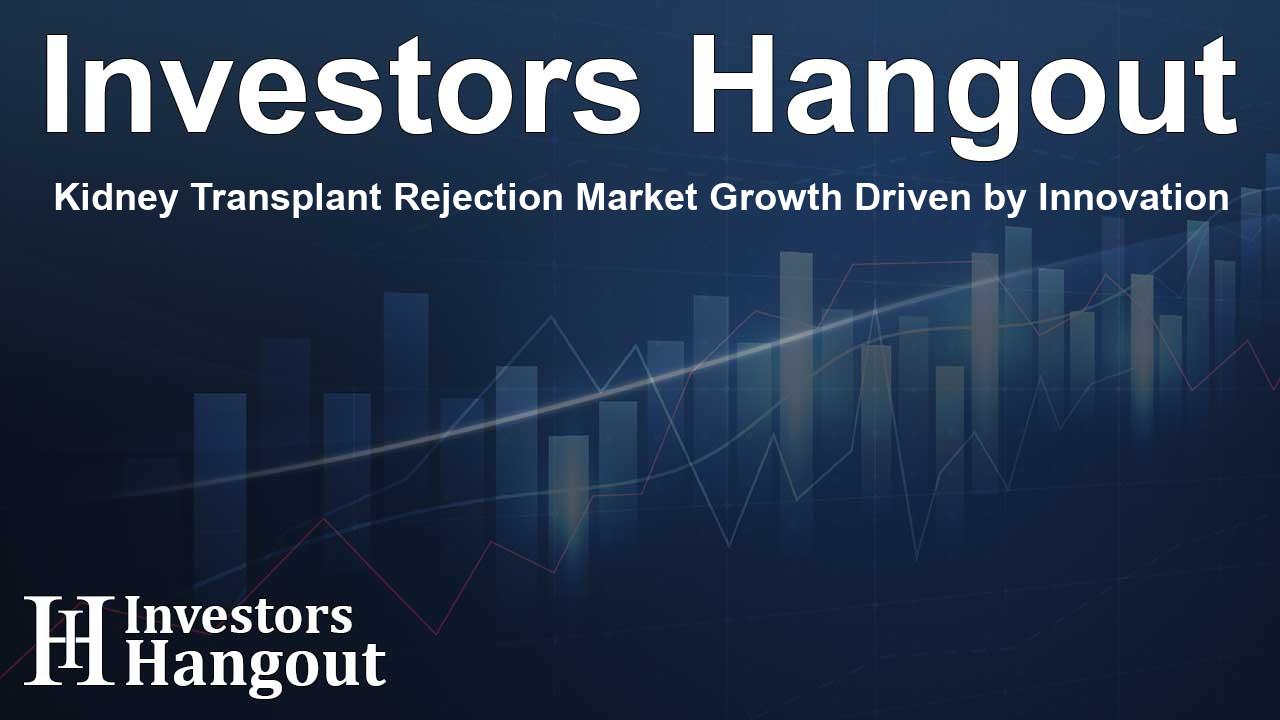Kidney Transplant Rejection Market Growth Driven by Innovation

Understanding the Growth of Kidney Transplant Rejection Market
The kidney transplant rejection prophylaxis market is on a path of steady growth. This trend is largely fueled by groundbreaking therapies such as MDR-101, tegoprubart (AT-1501), riliprubart (BIVV020), and TRK-001 (Tregs). The rise in the number of kidney transplants, driven by the influx of end-stage renal disease (ESRD) cases, is another pivotal factor supporting this market's expansion.
Current Market Insights
Research indicates that the market for kidney transplant rejection was valued at approximately USD 4 billion in 2023. The United States emerged as a substantial contributor to this market and is projected to experience significant growth during the forecast period leading up to 2034. Additionally, estimations suggest that the therapeutic MDR-101 could achieve USD 332.8 million in revenue by that time.
In 2023, an estimated 44,000 new kidney transplant cases occurred across the market. This number is expected to rise as more patients engage in transplantation processes. Key players, including Medeor Therapeutics, Eledon Pharmaceuticals, and Sanofi, are advancing therapies to enhance patient outcomes and protect against rejection.
The Mechanism of Kidney Transplant Rejection
Kidney transplant rejection is when a recipient's immune system perceives the donor organ as a foreign body and acts against it. This reaction can arise from human leukocyte antigen (HLA) differences, insufficient immunosuppressive therapy, or infections that activate immunity. The rejections can be categorized as acute, developing within days to months post-surgery, or chronic, manifesting over years and resulting in progressive kidney damage.
Role of Innovative Therapies
Numerous treatments are evolving in the landscape of kidney transplant rejection. One noteworthy advancement is a novel therapeutic strategy utilizing Regulatory T cells (Tregs). Clinical trials are currently examining TRK-001 in Phase II and TX200 in Phase I/II trials. Early results from TRK-001 have shown promise, with subsequent development continuing. Furthermore, TX200 is reported to be well tolerated in all participating patients as of the current evaluating period.
MYHIBBIN (mycophenolate mofetil) was approved by the FDA in recent years for its effectiveness in preventing acute rejection among kidney transplant recipients. ENVARSUS XR, also widely adopted in transplant centers, demonstrated critical efficacy in recent studies. Another significant therapy, IDEFIRIX, holds promise for individuals with heightened levels of donor-specific antibodies.
Market Dynamics and Challenges
The dynamics of the kidney transplant rejection market are shifting due to various factors such as the rising incidence of kidney transplants worldwide, synergy in effective surgical techniques, and continued innovation in immunosuppressive therapy. However, challenges persist such as chronic rejection detection complexities, high drug costs, and donor kidney shortages, impacting the overall management of transplantation.
Future of the Kidney Transplant Rejection Market
The future of the kidney transplant rejection market remains bright with anticipated advancements in immunosuppressive medications and diagnostics. New biologics in development may significantly enhance success rates in transplant management. Ongoing introductions of therapies tailored for specific patient populations are expected to stimulate market growth.
Frequently Asked Questions
What is the expected market growth rate for kidney transplant rejection?
The kidney transplant rejection market is expected to grow at a compound annual growth rate (CAGR) of 4.9% during the forecast period 2024 to 2034.
What are the leading therapies in the pipeline for kidney transplant rejection?
Prominent therapies in development include MDR-101, Tegoprubart (AT-1501), and TRK-001, which aim to enhance transplant acceptance and longevity.
What role does immunosuppression play in kidney transplants?
Immunosuppression is critical for preventing organ rejection by dampening the immune response against the transplanted kidney.
How many new kidney transplants occur annually?
In recent records, over 44,000 new kidney transplant cases were noted in 2023, with expectations for this number to rise in the future.
Who are the key players in the kidney transplant rejection market?
Notable companies driving innovation in this market include Medeor Therapeutics, Eledon Pharmaceuticals, Tract Therapeutics, and Sanofi.
About The Author
Contact Kelly Martin privately here. Or send an email with ATTN: Kelly Martin as the subject to contact@investorshangout.com.
About Investors Hangout
Investors Hangout is a leading online stock forum for financial discussion and learning, offering a wide range of free tools and resources. It draws in traders of all levels, who exchange market knowledge, investigate trading tactics, and keep an eye on industry developments in real time. Featuring financial articles, stock message boards, quotes, charts, company profiles, and live news updates. Through cooperative learning and a wealth of informational resources, it helps users from novices creating their first portfolios to experts honing their techniques. Join Investors Hangout today: https://investorshangout.com/
The content of this article is based on factual, publicly available information and does not represent legal, financial, or investment advice. Investors Hangout does not offer financial advice, and the author is not a licensed financial advisor. Consult a qualified advisor before making any financial or investment decisions based on this article. This article should not be considered advice to purchase, sell, or hold any securities or other investments. If any of the material provided here is inaccurate, please contact us for corrections.
